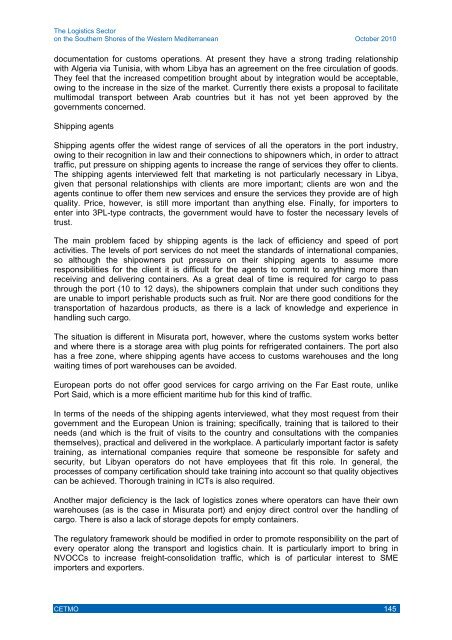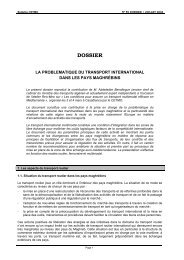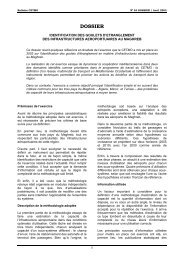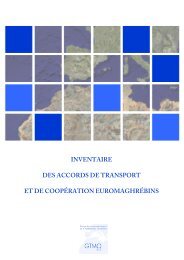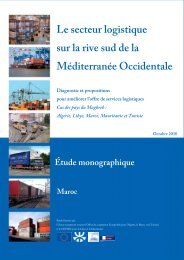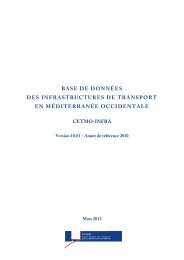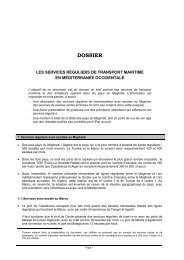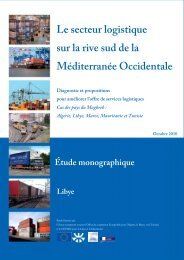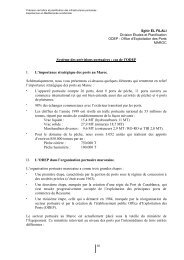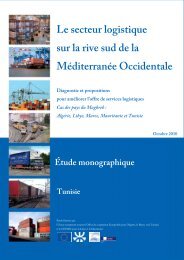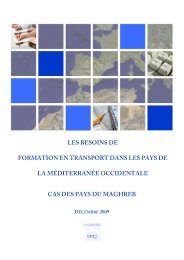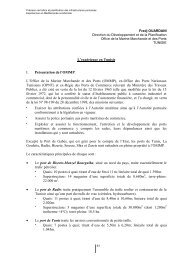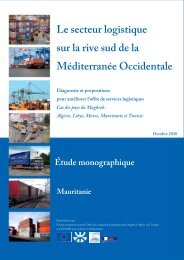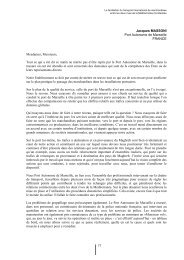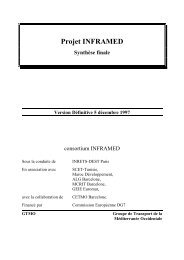The Logistics Sector on the Southern Shores of the Western ... - cetmo
The Logistics Sector on the Southern Shores of the Western ... - cetmo
The Logistics Sector on the Southern Shores of the Western ... - cetmo
- No tags were found...
You also want an ePaper? Increase the reach of your titles
YUMPU automatically turns print PDFs into web optimized ePapers that Google loves.
<str<strong>on</strong>g>The</str<strong>on</strong>g> <str<strong>on</strong>g>Logistics</str<strong>on</strong>g> <str<strong>on</strong>g>Sector</str<strong>on</strong>g><strong>on</strong> <strong>the</strong> Sou<strong>the</strong>rn <strong>Shores</strong> <strong>of</strong> <strong>the</strong> <strong>Western</strong> Mediterranean October 2010documentati<strong>on</strong> for customs operati<strong>on</strong>s. At present <strong>the</strong>y have a str<strong>on</strong>g trading relati<strong>on</strong>shipwith Algeria via Tunisia, with whom Libya has an agreement <strong>on</strong> <strong>the</strong> free circulati<strong>on</strong> <strong>of</strong> goods.<str<strong>on</strong>g>The</str<strong>on</strong>g>y feel that <strong>the</strong> increased competiti<strong>on</strong> brought about by integrati<strong>on</strong> would be acceptable,owing to <strong>the</strong> increase in <strong>the</strong> size <strong>of</strong> <strong>the</strong> market. Currently <strong>the</strong>re exists a proposal to facilitatemultimodal transport between Arab countries but it has not yet been approved by <strong>the</strong>governments c<strong>on</strong>cerned.Shipping agentsShipping agents <strong>of</strong>fer <strong>the</strong> widest range <strong>of</strong> services <strong>of</strong> all <strong>the</strong> operators in <strong>the</strong> port industry,owing to <strong>the</strong>ir recogniti<strong>on</strong> in law and <strong>the</strong>ir c<strong>on</strong>necti<strong>on</strong>s to shipowners which, in order to attracttraffic, put pressure <strong>on</strong> shipping agents to increase <strong>the</strong> range <strong>of</strong> services <strong>the</strong>y <strong>of</strong>fer to clients.<str<strong>on</strong>g>The</str<strong>on</strong>g> shipping agents interviewed felt that marketing is not particularly necessary in Libya,given that pers<strong>on</strong>al relati<strong>on</strong>ships with clients are more important; clients are w<strong>on</strong> and <strong>the</strong>agents c<strong>on</strong>tinue to <strong>of</strong>fer <strong>the</strong>m new services and ensure <strong>the</strong> services <strong>the</strong>y provide are <strong>of</strong> highquality. Price, however, is still more important than anything else. Finally, for importers toenter into 3PL-type c<strong>on</strong>tracts, <strong>the</strong> government would have to foster <strong>the</strong> necessary levels <strong>of</strong>trust.<str<strong>on</strong>g>The</str<strong>on</strong>g> main problem faced by shipping agents is <strong>the</strong> lack <strong>of</strong> efficiency and speed <strong>of</strong> portactivities. <str<strong>on</strong>g>The</str<strong>on</strong>g> levels <strong>of</strong> port services do not meet <strong>the</strong> standards <strong>of</strong> internati<strong>on</strong>al companies,so although <strong>the</strong> shipowners put pressure <strong>on</strong> <strong>the</strong>ir shipping agents to assume moreresp<strong>on</strong>sibilities for <strong>the</strong> client it is difficult for <strong>the</strong> agents to commit to anything more thanreceiving and delivering c<strong>on</strong>tainers. As a great deal <strong>of</strong> time is required for cargo to passthrough <strong>the</strong> port (10 to 12 days), <strong>the</strong> shipowners complain that under such c<strong>on</strong>diti<strong>on</strong>s <strong>the</strong>yare unable to import perishable products such as fruit. Nor are <strong>the</strong>re good c<strong>on</strong>diti<strong>on</strong>s for <strong>the</strong>transportati<strong>on</strong> <strong>of</strong> hazardous products, as <strong>the</strong>re is a lack <strong>of</strong> knowledge and experience inhandling such cargo.<str<strong>on</strong>g>The</str<strong>on</strong>g> situati<strong>on</strong> is different in Misurata port, however, where <strong>the</strong> customs system works betterand where <strong>the</strong>re is a storage area with plug points for refrigerated c<strong>on</strong>tainers. <str<strong>on</strong>g>The</str<strong>on</strong>g> port alsohas a free z<strong>on</strong>e, where shipping agents have access to customs warehouses and <strong>the</strong> l<strong>on</strong>gwaiting times <strong>of</strong> port warehouses can be avoided.European ports do not <strong>of</strong>fer good services for cargo arriving <strong>on</strong> <strong>the</strong> Far East route, unlikePort Said, which is a more efficient maritime hub for this kind <strong>of</strong> traffic.In terms <strong>of</strong> <strong>the</strong> needs <strong>of</strong> <strong>the</strong> shipping agents interviewed, what <strong>the</strong>y most request from <strong>the</strong>irgovernment and <strong>the</strong> European Uni<strong>on</strong> is training; specifically, training that is tailored to <strong>the</strong>irneeds (and which is <strong>the</strong> fruit <strong>of</strong> visits to <strong>the</strong> country and c<strong>on</strong>sultati<strong>on</strong>s with <strong>the</strong> companies<strong>the</strong>mselves), practical and delivered in <strong>the</strong> workplace. A particularly important factor is safetytraining, as internati<strong>on</strong>al companies require that some<strong>on</strong>e be resp<strong>on</strong>sible for safety andsecurity, but Libyan operators do not have employees that fit this role. In general, <strong>the</strong>processes <strong>of</strong> company certificati<strong>on</strong> should take training into account so that quality objectivescan be achieved. Thorough training in ICTs is also required.Ano<strong>the</strong>r major deficiency is <strong>the</strong> lack <strong>of</strong> logistics z<strong>on</strong>es where operators can have <strong>the</strong>ir ownwarehouses (as is <strong>the</strong> case in Misurata port) and enjoy direct c<strong>on</strong>trol over <strong>the</strong> handling <strong>of</strong>cargo. <str<strong>on</strong>g>The</str<strong>on</strong>g>re is also a lack <strong>of</strong> storage depots for empty c<strong>on</strong>tainers.<str<strong>on</strong>g>The</str<strong>on</strong>g> regulatory framework should be modified in order to promote resp<strong>on</strong>sibility <strong>on</strong> <strong>the</strong> part <strong>of</strong>every operator al<strong>on</strong>g <strong>the</strong> transport and logistics chain. It is particularly import to bring inNVOCCs to increase freight-c<strong>on</strong>solidati<strong>on</strong> traffic, which is <strong>of</strong> particular interest to SMEimporters and exporters.CETMO 145


